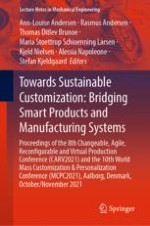2022 | OriginalPaper | Chapter
Framework for Adoption of Freeform Injection Molding in Discrete Manufacturing Companies
Authors : Elham Sharifi, Atanu Chaudhuri, Brian Vejrum Waehrens, Lasse Guldborg Staal, Saeed Davoudabadi Farahani
Published in: Towards Sustainable Customization: Bridging Smart Products and Manufacturing Systems
Publisher: Springer International Publishing
Activate our intelligent search to find suitable subject content or patents.
Select sections of text to find matching patents with Artificial Intelligence. powered by
Select sections of text to find additional relevant content using AI-assisted search. powered by
